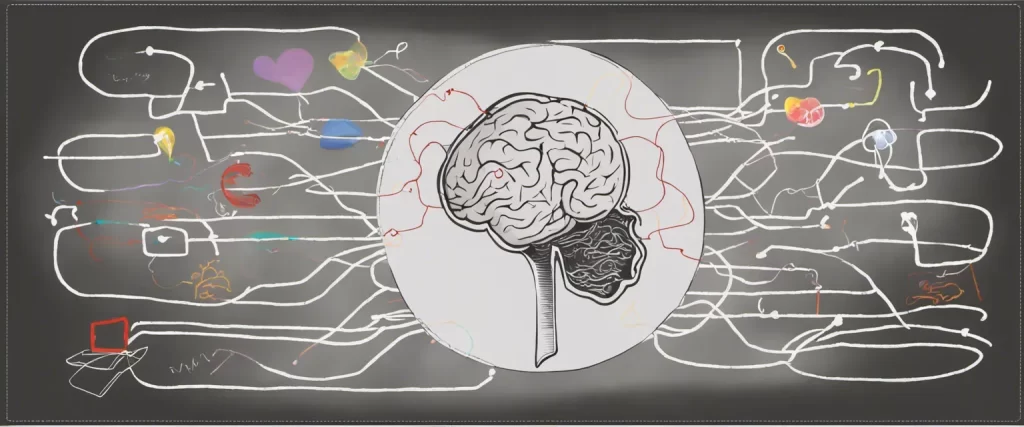
What is Mental Health
Mental health refers to a person’s emotional, psychological, and social well-being. It is a state of well-being in which individuals can cope with the normal stresses of life, work productively, and contribute to their community. Mental health is important at every stage of life, from childhood and adolescence through adulthood. Mental illnesses are common and can affect anyone, regardless of age, gender, race, or socioeconomic status. Mental health problems can range from common concerns such as anxiety and depression to more severe conditions like schizophrenia or bipolar disorder. It is important to prioritize mental health and seek help and support when needed to maintain overall well-being.
What Can We Get From Mental Health?
Mental health is essential for overall well-being and has the potential to impact every aspect of our lives. Here are a few things we can get from maintaining good mental health:
1. Emotional well-being: Mental health allows us to experience and manage a wide range of emotions in a healthy manner. It helps us develop resilience to cope with stress, heartbreak, and other challenging situations.
2. Improved relationships: Mental health enables us to form and maintain healthy relationships with others. It helps us communicate effectively, empathize, and build strong connections with friends, family, and partners.
3. Better physical health: There is a strong connection between mental and physical health. Good mental health can lead to better physical health outcomes as it encourages positive behaviors such as regular exercise, balanced diet, and adequate sleep.
4. Increased productivity: When our mental health is in a good state, we can think clearly, focus better, and make efficient decisions. This allows us to perform well in our personal and professional lives, leading to increased productivity.
5. Enhanced creativity and problem-solving skills: Good mental health can boost our creativity and ability to think outside the box. It encourages innovative thinking, problem-solving skills, and fosters a positive mindset.
6. Self-confidence and self-esteem: Mental health plays a crucial role in developing self-confidence and positive self-esteem. It helps us believe in ourselves, set goals, and feel accomplished, leading to a more fulfilling life.
7. Reduced risk of mental disorders: Taking care of our mental health can lower the risk of developing mental disorders such as anxiety, depression, and substance abuse. It provides a protective factor against various mental illnesses.
8. Overall happiness and life satisfaction: Ultimately, good mental health contributes to overall happiness and life satisfaction. It allows us to experience joy, contentment, and a sense of purpose in life.
Investing in our mental health is vital to achieving these benefits and living a fulfilling and balanced life. It is important to engage in self-care practices, seek professional help when needed, and maintain a supportive network of relationships.
Strategies in Learning Mental Health
1. Educate yourself: Start by reading books, articles, and reputable online resources about mental health topics. This will give you a foundational knowledge on different aspects of mental health.
2. Seek professional guidance: Consider seeing a therapist or counselor who specializes in mental health. They can provide you with personalized strategies, tools, and techniques to learn more about mental health.
3. Join support groups and communities: Connecting with others who have similar experiences can be incredibly beneficial. Look for local support groups or online communities where you can share your thoughts, concerns, and learn from others.
4. Practice self-care: Taking care of your own mental well-being is vital. Engage in activities that promote relaxation, stress reduction, and feelings of joy. This could include meditation, exercise, spending time in nature, pursuing hobbies, or practicing mindfulness.
5. Build healthy relationships: Surround yourself with supportive, positive people who contribute to your mental well-being. Engage in open and honest communication, maintain boundaries, and prioritize healthy connections.
6. Enhance your emotional intelligence: Developing emotional intelligence can help you better understand and manage your emotions, as well as the emotions of others. Consider exploring books, podcasts, or workshops on emotional intelligence to deepen your understanding.
7. Stay informed about current research: Keep up-to-date with the latest research and developments in the field of mental health. This will enable you to stay informed and better understand different conditions and treatment options.
8. Practice empathy and understanding: Learning to empathize and understand others’ mental health challenges is essential. Take the time to listen to others without judgment, be supportive, and validate their experiences.
9. Challenge mental health stigma: Advocate for mental health awareness and work towards reducing the stigma associated with mental illness. Engage in conversations, educate others, and share personal experiences to help bring about positive change.
10. Take care of your physical health: Physical and mental health are deeply interconnected. Ensure you are taking care of your physical health by maintaining a balanced diet, getting regular exercise, and getting enough sleep.

The Body Keeps the Score by Bessel Van der Kolk
Summary
The Body Keeps the Score” by Bessel Van der Kolk is a comprehensive exploration of trauma, its impacts on the body and mind, and ways to heal from its effects. The book draws from Van der Kolk’s extensive experience as a psychiatrist and researcher in the field of trauma.
The book begins by discussing the traditional approaches to trauma treatment and argues that conventional methods, such as talk therapy or medication, often fail to fully address the profound impact trauma has on individuals. Van der Kolk delves into the latest scientific research to explain how traumatic experiences can alter brain function, disrupt emotional regulation, and impair our ability to connect with others.
Van der Kolk introduces the concept of “traumatic memory” and highlights the ways trauma can be stored in the body, bypassing verbal narrative. He emphasizes the importance of understanding trauma as an embodied experience, focusing on bodily sensations, movement, and rhythms rather than solely relying on cognitive approaches.
Throughout the book, Van der Kolk explores various treatment modalities that have proven effective in helping individuals recover from trauma. These include somatic experiencing, EMDR (Eye Movement Desensitization and Reprocessing), yoga, neurofeedback, and theater. The author highlights the transformative power of these methods, which help individuals gradually reconnect with their bodies, reclaim their sense of agency, and reintegrate themselves into the world.
In addition to examining personal stories of trauma survivors, Van der Kolk also explores the impact of larger societal traumas, such as war, abuse, and neglect. He emphasizes the need for a collective response to trauma, calling for changes in public policy, education, and healthcare systems to better address the needs of individuals affected by trauma.
Overall, “The Body Keeps the Score” is a compelling and informative read that sheds light on the intricate relationship between trauma, the body, and mental health. It offers hope and practical guidance for survivors of trauma, clinicians, and anyone seeking a deeper understanding of the long-lasting effects of trauma and the pathways to healing.
Reasons for Recommendation
1. Comprehensive understanding of trauma: “The Body Keeps the Score” offers a deep exploration of the effects of trauma on mental health. It delves into the physiological, emotional, and psychological impact that trauma can have on an individual’s overall well-being.
2. Evidence-based approach: The book is rooted in scientific research and evidence, making it a reliable resource for mental health professionals and anyone interested in understanding trauma. Bessel Van der Kolk, a renowned psychiatrist, incorporates his extensive clinical experience with case studies and studies from various disciplines.
3. Holistic perspective: Van der Kolk takes a holistic approach to mental health by highlighting the interconnectedness of the mind, body, and emotions. He emphasizes the importance of addressing and integrating these aspects in order to heal from trauma effectively.
4. Practical tools and techniques: The book equips readers with practical strategies and techniques to promote healing from trauma. It covers a range of therapeutic approaches, including somatic experiencing, yoga, and EMDR (Eye Movement Desensitization and Reprocessing), providing readers with actionable steps to improve their mental health.
5. Empowering narratives: “The Body Keeps the Score” includes real-life stories and personal accounts of individuals who have experienced trauma and found healing. These narratives help readers empathize with survivors, understand their struggles, and provide hope while normalizing the challenges faced by individuals with trauma.
6. Societal implications: The book explores the broader implications of trauma and the impact it has on society. It discusses the role of trauma in addiction, violence, and the criminal justice system, shedding light on how trauma-informed approaches can help create a more compassionate and understanding society.
7. Rehabilitation possibilities: Through The Body Keeps the Score, Van der Kolk showcases the potential for healing and transformation for those who have experienced trauma. He offers insight into the possibility of reclaiming one’s life and breaking free from the long-lasting effects of trauma.
Overall, “The Body Keeps the Score” is highly recommended for mental health professionals, individuals seeking to understand trauma, and those looking for effective strategies to improve their own mental health. It provides a comprehensive understanding, evidence-based practices, and inspiring stories of resilience and recovery.

Think Like a Monk by Jay Shetty
Summary
Think Like a Monk by Jay Shetty is a self-help book that offers guidance and practical techniques to help readers cultivate a mindful and purposeful life, inspired by the practices of monks. Shetty, a former monk himself, combines ancient wisdom with modern philosophy and psychology to provide a comprehensive framework for self-improvement.
The book is divided into three parts: Let Go, Grow, and Give. In the first part, Let Go, Shetty discusses the importance of detaching oneself from negative emotions, harmful habits, and external validations. He explores the power of gratitude, forgiveness, and acceptance, emphasizing the significance of finding inner peace and happiness.
The second part, Grow, focuses on personal growth and development. Shetty provides strategies to enhance self-awareness, manage stress, and build positive habits. He explores topics such as mindfulness, meditation, and purposeful living, encouraging readers to align their actions with their true values and aspirations.
In the final part, Give, Shetty highlights the significance of service and compassion. He discusses the importance of empathetic communication, cultivating genuine relationships, and finding fulfillment through contribution to others. Shetty shares stories and experiences from his own journey, revealing how practicing selflessness and kindness can bring joy and fulfillment.
Throughout the book, Shetty combines personal anecdotes, philosophical insights, and practical exercises, making Think Like a Monk an engaging and interactive read. He challenges readers to reconsider their mindset, question societal norms, and take responsibility for their own happiness and growth. Ultimately, Shetty offers a roadmap for transforming one’s life by adopting the principles and practices of monks, inviting readers to lead a more purposeful, mindful, and fulfilling existence.
Reasons for Recommendation
1. Mindfulness and meditation: Think Like a Monk explores the principles of mindfulness and meditation, which have been proven to have numerous mental health benefits. By diving deep into these practices, the book provides practical techniques for reducing stress, anxiety, and increasing overall mental well-being.
2. Emotional regulation: The book delves into the art of emotional regulation, teaching readers how to handle their emotions more effectively. This can be particularly helpful for those struggling with mood disorders or difficulty managing overwhelming feelings.
3. Developing a growth mindset: Think Like a Monk encourages readers to adopt a growth mindset, which is highly beneficial for mental health. By cultivating a mindset that embraces learning, resilience, and self-improvement, individuals can better navigate challenges and setbacks, leading to increased resilience and reduced vulnerability to mental health issues.
4. Self-reflection and self-awareness: The book emphasizes the importance of self-reflection and self-awareness in personal growth. By examining our thoughts, beliefs, and behaviors, we can gain a deeper understanding of ourselves and our mental health. This heightened self-awareness can lead to better self-care, more effective coping strategies, and improved mental well-being.
5. Building strong relationships: Think Like a Monk explores the significance of meaningful relationships and human connection. Strong social support has been linked to better mental health outcomes, and the book provides insights and guidance on fostering healthier relationships, setting boundaries, and practicing empathy.
6. Overcoming negative thinking patterns: The book teaches readers how to challenge and overcome negative thinking patterns that contribute to mental health issues such as anxiety and depression. By recognizing and reframing negative thoughts, readers can cultivate a more positive and balanced mindset.
7. Finding purpose and meaning: Think Like a Monk helps readers explore their purpose and discover deeper meaning in their lives. Having a sense of purpose has been associated with enhanced mental well-being, as it provides a sense of direction and fulfillment. By guiding readers through this process, the book supports overall mental health.
8. Stress management: With its focus on mindfulness, self-care, and emotional well-being, Think Like a Monk offers practical strategies for managing stress. By incorporating these techniques into daily life, readers can develop healthier coping mechanisms and improve their overall mental health.
Overall, Think Like a Monk offers a comprehensive and holistic approach to mental health, incorporating mindfulness, self-reflection, emotional regulation, and personal growth. By adopting the principles and techniques discussed in the book, individuals can enhance their mental well-being, cultivate resilience, and develop a positive mindset.
Hidden Valley Road by Robert Kolker
Summary
Hidden Valley Road, written by Robert Kolker, is a nonfiction book that tells the captivating story of the Galvin family. The Galvins seemed like a typical American family in the 1960s, living in a tidy middle-class neighborhood in Colorado. However, over the years, six of their twelve children were diagnosed with schizophrenia.
Kolker delves into the fascinating history of the Galvin family, unfolding their personal struggles, losses, and resilience. The book begins by introducing Don and Mimi Galvin, the parents, and depicts their idyllic life as they embrace the American dream. However, the family’s life takes a turn when their eldest son, Donald, starts to exhibit signs of mental illness, which later progresses into full-blown schizophrenia.
As the years go by, more and more Galvin children start showing symptoms of schizophrenia. The family is thrust into the world of psychiatric institutions, experimental treatments, and the rollercoaster of hope and despair. Kolker meticulously pieces together the complex medical and environmental factors that may have contributed to the Galvin siblings’ shared mental illness.
Through extensive research and interviews with family members, Kolker sheds light on the Galvin family’s experiences, highlighting the struggles they faced over the decades, both individually and as a family unit. The book also explores the impact of mental illness on the other siblings who did not develop schizophrenia, as well as the strain it puts on their parents’ marriage.
Hidden Valley Road delves into the scientific community’s attempt to unravel the mysteries of mental health, especially schizophrenia. It explains the prevailing theories at the time and how the Galvin family became a vital case study for researchers, offering valuable insights into the genetic and environmental factors that may contribute to the development of mental illnesses.
Ultimately, Hidden Valley Road is a poignant and deeply personal narrative that weaves together the Galvin family’s story with the wider context of mental health research. It sheds light on the challenges faced by individuals with schizophrenia and their families, while also providing a deeper understanding of the complexities of mental illness.
Reasons for Recommendation
1. In-depth Understanding of Mental Illness: “Hidden Valley Road” provides a deep and comprehensive exploration of mental illness, specifically schizophrenia. It offers a profound understanding of the disorder, its symptoms, and the impact it has on individuals and their families. Readers gain insight into the complexity of mental health conditions and the challenges they present.
2. Real-life Perspective: The book is based on a true story, following the Galvin family as they navigate the struggles of living with multiple affected members. This true-to-life account offers an authentic perspective on mental health, making it highly relatable and engrossing for readers interested in mental health issues.
3. Family Dynamics: “Hidden Valley Road” delves into the dynamics of a large family trying to cope with the burden of mental illness. The book explores the strain on relationships, the impact on siblings, and the various coping mechanisms used by the family. It sheds light on the complexity of familial support and how different individuals within the family respond to mental illness.
4. Research and Science: Robert Kolker weaves the Galvin family’s story with scientific research and advancements in the field of mental health. Readers learn about the history of schizophrenia, the search for genetic links, and the evolving understanding of the disorder. This combination of personal narrative and scientific exploration allows for a well-rounded understanding of mental health.
5. Destigmatization: “Hidden Valley Road” helps in destigmatizing mental illness by portraying it in a compassionate and empathetic light. The book humanizes those affected by mental health conditions and encourages readers to view individuals struggling with mental illness with greater understanding and acceptance.
6. Implications for Treatment and Support: The book explores a range of treatments and interventions employed by the Galvin family throughout their journey. It raises important discussions about mental health treatment, the need for early intervention, and the importance of social support networks. Readers interested in mental health advocacy or wanting to learn about potential avenues for treatment will find this book informative.
7. Inspirational Resilience: Through the Galvin family’s story, “Hidden Valley Road” showcases immense resilience and strength in the face of adversity. Despite the challenges they face, the family’s determination to stick together and support each other is inspiring. Readers can draw courage and inspiration from the Galvin family’s experiences.
8. Promotes Empathy and Understanding: By exposing readers to the intimate struggles of individuals with mental illness, the book fosters empathy, compassion, and understanding. It provides an opportunity for readers to expand their knowledge and challenge their preconceptions about mental health.
Overall, “Hidden Valley Road” is recommended from a mental health perspective due to its educational value, real-life perspective, destigmatization efforts, and its ability to inspire empathy and understanding towards individuals living with mental illness.
Pingback: Unlocking Resilience: Essential Books for Healing Childhood Trauma - Paidread